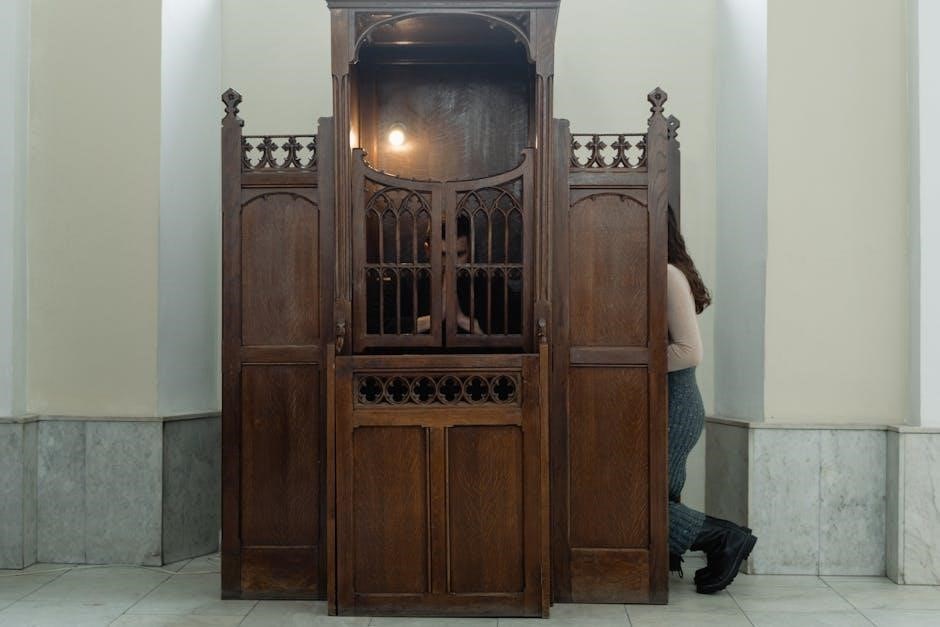Catholic Confession: A Comprehensive Guide
This comprehensive guide offers insights into the Catholic practice of Confession. It provides resources such as printable guides, examination of conscience tools, and prayers. Discover how to prepare for Confession, understand sin, and find healing through reconciliation with God, as well as confession times.
The Importance of Regular Confession
Regular Confession is vital in Catholic life, offering a pathway to spiritual healing and growth. Like the prodigal son returning to his father, Confession allows us to return to God with a contrite heart, acknowledging our sins and seeking forgiveness. Modern society’s diminished sense of sin underscores the importance of this sacrament.
Through regular Confession, we confront our failings and receive grace to overcome them. Confession strengthens our relationship with Christ, purifies the soul, and helps us recognize sin in our daily actions and omissions. Regular participation in Confession is a pious practice that fosters humility and spiritual awareness.
The Fathers of Mercy emphasize Confession’s role in receiving God’s mercy, and it’s not just a checklist but an opportunity for genuine self-reflection and transformation. By confessing sins, especially mortal ones, we obtain absolution and restore our communion with God. Even confessing venial sins is a beneficial habit, contributing to ongoing spiritual refinement and deepening our faith journey. Confession is a path to healing and a stronger soul, guiding us toward a more virtuous life.
Examination of Conscience: Preparing for Confession
Preparing for Confession involves a thorough examination of conscience. This reflection helps us recall sins committed in thoughts, words, deeds, and omissions. It’s a crucial step, requiring quiet time and prayerful consideration. Asking the Holy Spirit for guidance ensures a genuine and helpful review of our actions.
A good examination of conscience is not merely a checklist but a means to understand areas needing change. By reflecting on the Ten Commandments and Church precepts, we identify offenses against God and neighbor. Consider selfishness toward family, failings in love, and neglect of spiritual duties.
Tools like interactive guides and printable brochures aid in this process. These resources often include questions based on commandments and capital sins, prompting deeper reflection. The goal is to approach Confession with a clear understanding of our sins and a sincere desire for forgiveness. Regular examination of conscience fosters ongoing conversion and strengthens our commitment to living a virtuous life by helping us to remember sins committed.

Examination of Conscience Based on the Ten Commandments
The Ten Commandments provide a framework for examining our conscience. The First Commandment calls us to worship God alone. Have we given God sufficient time in prayer? Did we place other priorities or idols before Him? Have we doubted or denied our faith? The Second Commandment concerns reverence for God’s name. Have we used God’s name carelessly or profanely? Have we broken promises made in God’s name?
The Third Commandment reminds us to keep the Lord’s Day holy. Have we neglected Mass on Sundays or holy days of obligation? Have we avoided unnecessary work on these days? The Fourth Commandment deals with honoring parents. Have we disrespected or disobeyed our parents? Have we neglected our duties to our family? The Fifth Commandment protects life. Have we harmed anyone physically or emotionally? Have we harbored anger or resentment?
The Sixth and Ninth Commandments concern purity. Have we entertained impure thoughts or desires? Have we engaged in immoral actions? The Seventh and Tenth Commandments address justice and covetousness. Have we stolen or damaged property? Are we envious of others’ possessions? The Eighth Commandment requires truthfulness. Have we lied or spread rumors? Considering these questions helps us identify sins needing confession.
Examination of Conscience Based on the Seven Capital Sins
The Seven Capital Sins – pride, greed, lust, anger, gluttony, envy, and sloth – are fundamental vices that can lead to other sins. Examining our conscience through this lens helps us recognize deeper patterns of sin in our lives. Pride, an excessive belief in one’s own abilities, can manifest as arrogance or a refusal to admit fault. Have I been boastful or dismissive of others?
Greed, an insatiable desire for material possessions, can lead to theft or exploitation. Have I been overly concerned with wealth? Lust, disordered sexual desire, can lead to objectification and infidelity. Have I entertained impure thoughts? Anger, uncontrolled rage, can damage relationships and lead to violence. Have I harbored resentment or sought revenge?
Gluttony, excessive indulgence in food or drink, can harm our health and cloud our judgment. Have I been immoderate in my habits? Envy, resentment of others’ good fortune, can poison our hearts. Have I been jealous of others’ success? Sloth, spiritual or physical laziness, can prevent us from fulfilling our responsibilities. Have I neglected my duties to God or others? Reflecting on these sins offers a path to identify areas needing change and repentance.
How to Confess: A Step-by-Step Guide
Confession, also known as the Sacrament of Penance or Reconciliation, is a profound encounter with God’s mercy. This step-by-step guide will assist you. First, prepare by examining your conscience, reflecting on your sins. A detailed examination of conscience, based on the Ten Commandments or the Seven Capital Sins, can be immensely helpful. Pray for guidance from the Holy Spirit.
Next, upon entering the confessional, the priest will greet you. Begin by saying, “Bless me, Father, for I have sinned. It has been [time period] since my last Confession.” Then, confess your sins honestly and completely. Be specific about the types of sins and, if possible, the number of times you committed them, especially mortal sins.
After confessing, listen to the priest’s counsel and penance. The priest will then offer absolution, forgiving your sins in the name of Christ. Make an Act of Contrition expressing sorrow for your sins and a commitment to amend your life. Finally, fulfill the penance given by the priest as a sign of your repentance and gratitude for God’s forgiveness. Remember, Confession is a pathway to healing and spiritual growth.
Confessing Mortal vs. Venial Sins
In Catholic teaching, sins are categorized as either mortal or venial, each carrying different spiritual consequences. Understanding the distinction between them is crucial for a meaningful Confession. Mortal sins are grave offenses against God that destroy charity in the heart of man. For a sin to be mortal, three conditions must be met: grave matter, full knowledge, and deliberate consent. Examples include serious violations of the Ten Commandments.

It is essential to confess all mortal sins in Confession, specifying the kind and number of times committed. Failure to confess a mortal sin knowingly invalidates the Sacrament. Venial sins, on the other hand, are less serious offenses that wound charity but do not destroy it. While not required, confessing venial sins is a good and pious practice, helping us grow in virtue and avoid future mortal sins.
Confessing venial sins increases grace and strengthens our relationship with God. Regular Confession, even for venial sins, cultivates a more sensitive conscience and a deeper awareness of God’s love. Remember, the primary aim of Confession is to reconcile with God and receive His healing grace, whether confessing mortal or venial sins.
Prayers Before and After Confession

Prayer is an essential component of the Sacrament of Confession, both before and after receiving absolution. Prayers before Confession help us to prepare our hearts, examine our conscience, and ask for God’s grace to make a sincere and honest confession. One might pray to the Holy Spirit, asking for guidance in recalling sins and for the courage to confess them openly.
A prayer before Confession might include asking for sorrow for one’s sins and a firm purpose of amendment, resolving to avoid those sins in the future. After Confession, prayers of thanksgiving are appropriate, expressing gratitude for God’s mercy and forgiveness. We can also pray for the strength to live out the penance assigned by the priest and to continue growing in holiness.
Prayers after Confession reinforce our commitment to change and help us to remain steadfast in our faith. These prayers can also include intercessions for others, asking God to extend His mercy to all sinners. Utilizing specific prayers before and after Confession enhances the experience, deepening our connection with God and fostering spiritual growth. Remember to approach Confession with a prayerful heart, open to God’s grace.
Confession as a Path to Healing and Strengthening the Soul
The Sacrament of Confession is much more than just a ritual; it is a powerful means of healing and strengthening the soul. Through Confession, we receive God’s grace and forgiveness, which cleanses us from the stain of sin and restores our relationship with Him. This act of reconciliation provides deep spiritual healing, alleviating the burden of guilt and shame that sin carries.
Confession also strengthens our soul by providing us with the spiritual tools to overcome future temptations. The priest’s counsel and the penance assigned offer practical guidance and encouragement to live a more virtuous life. Regular Confession fosters self-awareness, helping us to recognize our weaknesses and develop strategies to avoid sin. This continuous process of examination, confession, and amendment cultivates a stronger moral character.
Moreover, the act of confessing our sins with humility requires courage and vulnerability, which in turn builds inner strength. By acknowledging our faults and seeking forgiveness, we break free from the cycle of sin and move closer to God’s love. Confession is a transformative journey that heals past wounds and empowers us to live a life of greater holiness and peace.
Confession Resources: Printable Guides and Interactive Tools
To aid in preparing for the Sacrament of Confession, numerous resources are available, including printable guides and interactive tools. These resources are designed to assist individuals in conducting a thorough examination of conscience, understanding the steps involved in Confession, and finding suitable prayers. Printable guides offer a structured format for reflecting on one’s actions, categorizing sins based on the Ten Commandments or the Seven Capital Sins.
These guides can be particularly helpful for those who prefer a tangible aid during their preparation. Interactive tools, such as online examinations of conscience, provide a dynamic and engaging way to identify sins. These tools often include questions tailored to different age groups and life situations, making the process more personalized and relevant.

Additionally, many websites offer step-by-step instructions on how to go to Confession, including the prayers to recite and the proper etiquette. Some resources also provide prayers for before and after Confession, helping individuals to approach the sacrament with a spirit of humility and gratitude. By utilizing these resources, individuals can enhance their preparation and experience a more meaningful and fruitful Confession. These tools aim to make the sacrament more accessible and understandable for all.
Finding Confession Times and Locations
Locating convenient Confession times and places is essential for regular participation in this Sacrament. Parishes typically offer scheduled Confession times, often on Saturdays or before major feast days. These times are usually listed in the parish bulletin, on the parish website, or announced during Mass. Many dioceses also maintain online directories of parishes, including information on Mass and Confession schedules.
For those with busy schedules or limited mobility, it can be helpful to inquire about alternative Confession times or locations. Some parishes may offer Confession by appointment, allowing individuals to schedule a time that works best for them. Additionally, certain religious orders or retreat centers may provide Confession opportunities outside of regular parish hours.
Websites and apps dedicated to Catholic resources can also be valuable tools for finding Confession times and locations. These platforms often allow users to search for parishes near them and view their Confession schedules. Some even offer features such as maps and directions, making it easier to plan a visit. When seeking Confession, it is always advisable to confirm the schedule with the parish directly, as times may be subject to change. This ensures that individuals can receive the Sacrament in a timely and convenient manner.





